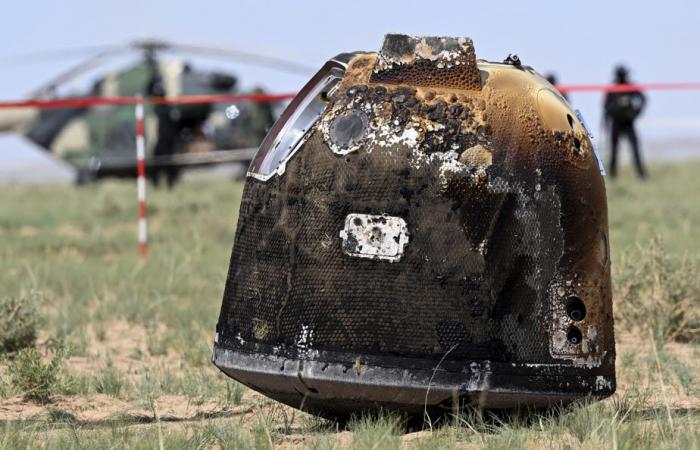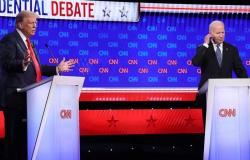(Hong Kong) The Chinese lunar mission which ended on Tuesday demonstrated the scientific prowess of the Asian giant and also triggered a torrent of disinformation targeting its American rival, a sign of the bitter rivalry between the two nations in space.
Posted at 7:12 a.m.
Tommy Wang and Rachel Blundy, with Anuj Chopra in Washington
France Media Agency
China celebrated the return to Earth of the Chang’e-6 probe on Tuesday, with on board the first samples ever brought back from the far side of the Moon, a “complete success” according to the Chinese space agency.
This mission, among the most ambitious ever carried out by China in space, has however revived old conspiracy theories about the moon landings of the Apollo lunar missions of NASA, the American space agency.
The AFP digital investigation unit analyzed a series of publications on Chinese social networks. Some suggest that Apollo 11, the historic mission that allowed the first man to walk on the Moon in 1969, was staged.
Researchers fear that this false information will fuel anti-American sentiment in China, which now intends to take the lead in the space sector ahead of the United States.
Another example of the disinformation circulating in the country, when the photo of the Chinese flag planted on the lunar surface was broadcast by the national space agency, X users compared it to a photo of American astronaut Harrison Schmitt on the Moon dating from 1972 and suggested that the latter was staged.
CNSA ARCHIVE PHOTO, PROVIDED BY ASSOCIATED PRESS
The Chinese flag on the lunar surface.
These Internet users argued that the American flag had been photographed “floating” in the wind –– something impossible on the Earth’s natural satellite – while NASA had explained that it had used a horizontal bar to keep it straight.
“There is undeniably a rivalry between the United States and China in space, and any form of misinformation about the activities of either country is concerning,” underlines researcher Saadia M. Pekkanen, of the University of Washington.
“Anti-American sentiment”
These publications sparked a deluge of comments on the Chinese social network Weibo after a user with more than 13 million subscribers claimed that these photos were proof that “Americans did not land on the Moon”.
Others picked up on the issue, sharing a photo of members of German band Rammstein dressed as astronauts without helmets, with a sarcastic caption: “Now you think the American moon landing was real.”
AFP was unable to establish whether this false information had been spread with the help of the Chinese authorities, but the speed with which it spread on highly controlled social networks, analysts question.
“Beijing sometimes lets anti-American sentiment and false information spread on the Chinese internet in order to provide a relief for internal tensions and shape Chinese public opinion,” underlines Isaac Stone Fish, managing director of Strategy Risks.
China has considerably developed its space programs over the past thirty years, injecting billions of euros into this sector in order to catch up with the American, Russian and European leaders.
The Asian giant hopes to launch its first manned mission to the Moon by 2030. It also plans to build a lunar base. For its part, Washington plans to send astronauts to the Moon again by 2026 with its Artemis 3 mission.
“Spreading a lie”
This disinformation campaign, which aims to instill a sense of distrust by re-spreading old conspiracy theories, is a tactic frequently used in China.
“There is a large online community that is happy to talk about conspiracy theories about the moon landings,” said Darren Linvill of Clemson University.
“If this community can be exploited to spread a lie that puts China in a more positive light, that’s good for China,” he continued.
In China, the landing of the Chang’e-6 probe excited the country’s press, which showered it with praise while criticizing the United States.
For the daily Global Times, with a resolutely nationalist tone, the Chinese space mission demonstrated “China’s open and inclusive attitude towards international cooperation”, unlike the United States, which is more “busy in chanting (l existence of a) “Chinese threat” in an alleged space race”.







